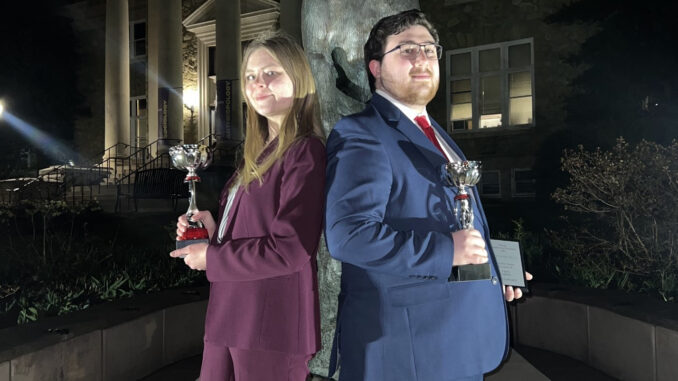
Max Marcello | Staff Writer
March 23, 2023
For the first time as a team, Duquesne University’s Debate Society practiced the art of rhetoric at the Pi Kappa Delta national forensic tournament in West Chester, Pennsylvania.
Over the week of March 17, six Duquesne students competed in several rounds of events. Both individual students and teams advanced through several rounds, and the most successful Duquesne team reached the semi-final round, receiving a third and fourth-place in the nation.
Debate competitions were each organized in a different way. In parliamentary debating, participants are given a world issue, typically politics-related, and they have around 30 minutes to prepare. Each team is then allotted seven to eight minute speaking times with an additional four to five minutes to make closing arguments.
Impromptu speaking, is an individual competition in which students selected one of three potential prompts and have a total of seven minutes to brainstorm, develop an argument and deliver that argument. Other forensic events included readings and more theatrical interpretation events.
At the tournament, two of Duquesne’s three competing debate teams made it through the preliminary rounds and into the four round of finals.
The parliamentary debate team, made up of sophomore Allison Rousu and freshman Nick Freilino, worked its way through octofinals, quarterfinals, and semifinals before being defeated in a debate where they were required to defend reinstating the draft. In total, the duo won seven straight rounds of parliamentary debate and lost their semi-final, eighth debate.
Freilino discovered his passion for debating while in high school. Now in college, Freilino is a quadruple major in liberal arts, majoring in Spanish, international relations, political science and international security with a pre-law certificate. The Duquesne freshman placed tenth for overall best speaker at the Pi Kappa Delta competition.
Reflecting upon his experience at the tournament Freilino said, “Debate… really makes you consider the perspectives of those you disagree with. And that’s given me a lot more informed, nuanced perspectives on political issues.”
“I feel even stronger in my belief system now than I did before because I’ve actually considered the other side’s arguments more fully,” he said.
Rousu, a sophomore business student, currently serves as the organization’s president.
As the society’s president, Rousu organizes the team’s strategy and practices. At the heart of this team is dedication and passion shared by all its members, she said.
“The average college student wouldn’t give up their Fridays and Saturdays to go debate a bunch of random topics and give a bunch of speeches unless they really cared, and it’s a lot of fun. We’re all really close,” Rousu said.
The debate society is open to all majors and backgrounds. All academic disciplines are encouraged to consider becoming a member of the debate society.
“There’s a lot of new opportunities. We recently made a switch to a different debate circuit that also focuses on a lot of forensics. In addition we will also still be engaged in parliamentary debates as we’re looking to hold more public events,” Rousu said. The new circuit is Collegiate Forensics Association which includes more speech and philosophical debate topics.
Debate season starts in the fall which the society eagerly awaits, Rousu said. The team practices four times a week for at least an hour. Duquesne offers debate as a class which is why practices are scheduled for the early afternoon.
Dr. Anthony Wachs, a professor of rhetoric in the communications department, serves as the debate society’s faculty advisor.
The 2022-2023 debate season was his first in the role as sole faculty advisor, but Wachs is no stranger to debate as he was part of his own college’s debate team. Even with a younger, underclassmen-heavy team, Duquesne was able to find success.
At last week’s competition, experience brackets were removed, allowing novice debaters to engage with more experienced rivals on a collegiate circuit.
“Debate is a persuasive game that can be somewhat subjective, only because in our final rounds, we had three judges that had to vote on a single ballot. Sometimes judges disagree upon who was most persuasive. Ultimately, there is a subjectivity to that, but every judge is weighing this upon the logic that is being used,” Wachs said.
Parliamentary debates are scored on a scale from 0 to 30 – 30 given to the debate’s best speaker. Impromptu debates are judged in a similar fashion.
When the scores were tabulated, Duquesne took a series of semifinalist awards in parliamentary debate to, impressing Wachs. The final point tallies put Duquesne in the top third and fourth places in the nation.
“It’s really about becoming a persuasive leader within society. I really do have hope that in the future we will be one of those big teams with a very natural national presence that people are saying, ‘Watch out for Duquesne University,’” Wachs said.

